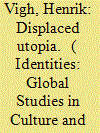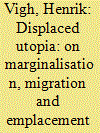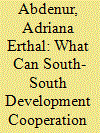|
|
|
Sort Order |
|
|
|
Items / Page
|
|
|
|
|
|
|
| Srl | Item |
| 1 |
ID:
110990


|
|
|
|
|
| Publication |
2012.
|
| Summary/Abstract |
With the death of its most recent president Malam Bacai Sanha, Guinea-Bissau has once again been plunged into turmoil and political uncertainty.Kate Thomas assesses the best-and worst case scenarios for the troubled country.
|
|
|
|
|
|
|
|
|
|
|
|
|
|
|
|
| 2 |
ID:
158424


|
|
|
|
|
| Summary/Abstract |
This article looks at the subjectivities of disenfranchised urban men in Bissau, the capital of Guinea-Bissau. Taking its point of departure in an illumination of the ‘thrown’ character of subjectivity, it clarifies the social positions and futures that life in the city is seen to afford. As the city has been caught in a prolonged period of conflict and decline, the retrenchment of the state, economy and social networks has created a setting where people struggle to achieve positive social presence and brighter prospects. The article shows how subjectivities in such situations can become tied to a sense of depreciation and downward mobility. In doing so, it illuminates some of the more common features of social exclusion that affect the urban poor and shows how the processes of decay and deterioration that peoples’ lives are caught in may create a longing for better futures and worthy social emplacement. They spur a striving for socially appreciated being that is imagined as elusively attainable through migration.
|
|
|
|
|
|
|
|
|
|
|
|
|
|
|
|
| 3 |
ID:
160100


|
|
|
|
|
| Summary/Abstract |
This article looks at the subjectivities of disenfranchised urban men in Bissau, the capital of Guinea-Bissau. Taking its point of departure in an illumination of the ‘thrown’ character of subjectivity, it clarifies the social positions and futures that life in the city is seen to afford. As the city has been caught in a prolonged period of conflict and decline, the retrenchment of the state, economy and social networks has created a setting where people struggle to achieve positive social presence and brighter prospects. The article shows how subjectivities in such situations can become tied to a sense of depreciation and downward mobility. In doing so, it illuminates some of the more common features of social exclusion that affect the urban poor and shows how the processes of decay and deterioration that peoples’ lives are caught in may create a longing for better futures and worthy social emplacement. They spur a striving for socially appreciated being that is imagined as elusively attainable through migration.
|
|
|
|
|
|
|
|
|
|
|
|
|
|
|
|
| 4 |
ID:
141476


|
|
|
|
|
| Summary/Abstract |
There is increasing international concern about the growth of organized crime in Africa. Important criminal organizations and professional criminals are present in Africa, but we argue that the term “organized crime” is not a very useful description of their activity, since what we are actually witnessing is a reformulation of politics and crime into networks that transcend the state/non-state boundary in ways that are hardly subsumed in standard concepts of organized crime. Similar processes are taking place in various parts of the world, and thus African countries are not exceptional in this regard. The process, however, does take particular forms in Africa that arise out of the histories of individual countries. The article describes the evolution in countries as diverse as Libya, Guinea-Bissau, and Zimbabwe of a market for protection, as business people – legitimate and otherwise – seek protection for their activities and their personnel. This market for protection is created by making private arrangements, often with state officials working in private capacities. The implications are profound: they could amount to a new mode of governance connecting Africa to international markets and institutions in which the distinctions between licit and illicit economic activity become difficult to detect.
|
|
|
|
|
|
|
|
|
|
|
|
|
|
|
|
| 5 |
ID:
142548


|
|
|
|
|
| Summary/Abstract |
Guinea-Bissau has been regularly described as a ‘narco-state’. Yet, few studies analyse how drug trafficking has evolved here. Based on extensive interviews in Guinea-Bissau over several years, this paper documents the process. It concludes that using the term ‘narco-state’, where much of the state has little or no capacity, is inappropriate. A better approach is to analyse the actions of key players as an elite protection network. In Guinea-Bissau, that network did not act on its own, but relied on a series of ‘entrepreneurs' who operated as an interface between traffickers and the elite. While the military as an institution is often said to be in charge of trafficking, exclusive control by high-ranking military personnel within the elite network only occurred relatively late. Senior soldiers' attempts to provide more than just protection, and to enter the drug market themselves, led to the network's undoing.
|
|
|
|
|
|
|
|
|
|
|
|
|
|
|
|
| 6 |
ID:
185353


|
|
|
|
|
| Summary/Abstract |
Portugal, in an attempt to retain its colonial possession of Guiné, fought a war there between 1961 and 1974. The opposition nationalist movement, known by its acronym PAIGC, sought to establish “liberated zones” within the difficult terrain of the more remote regions of the colony and service these from its immediate neighbour Guinea-Conakry, which had given it sanctuary. The PAIGC hosted its aid donors on carefully staged visits to these zones in an attempt to provide a picture of success in its “people's war.” The Swedish government, its primary non-military donor, decided to create a propaganda film featuring “heroic PAIGC freedom fighters” in action in one of these zones. This is the story of a well-intentioned yet naïve Swedish government effort at film-making and its largely misplaced aid in the face of the serious Portuguese air threat to PAIGC liberated zones.
|
|
|
|
|
|
|
|
|
|
|
|
|
|
|
|
| 7 |
ID:
129605


|
|
|
| 8 |
ID:
155708


|
|
|
|
|
| Summary/Abstract |
Until it began waning due to economic crisis and political turmoil on the domestic front, in Brazil’s rapidly expanding South-South development, cooperation often has been promoted by government officials as contributing to stability and prosperity in partner states. It is unclear, however, how this development cooperation intersects with the country’s involvement in UN peace operations. This article examines the role of Brazilian South-South technical cooperation across two contexts. In Haiti, Brazil has led the military component of the MINUSTAH, whereas in Guinea-Bissau, it has helped to spearhead peacebuilding efforts by the international community. In both cases, Brazil has tried to substantiate its critique of the UN’s securitization by providing technical cooperation across a variety of sectors. The analysis shows that this cooperation is too fragmented, subject to interruptions, and disconnected from UN-led efforts to make a considerable contribution to a sustainable peace. However, better internal coordination and stronger ties to UN initiatives could boost the contribution of Brazil’s Brazilian South-South development cooperation to a lasting peace.
|
|
|
|
|
|
|
|
|
|
|
|
|
|
|
|
|
|
|
|
|